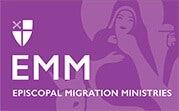About
The Rainbow Initiative is Episcopal Migration Ministries’ response to General Convention 2022 Resolution D045 “On Supporting LGBTIQ+ Refugees and Asylum Seekers”, which directed the Episcopal Church to promote support for people who have fled their countries because of persecution based on sexual orientation, gender identity, gender expression, and/or sex characteristics. The Resolution also directs Episcopal Migration Ministries to focus attention on people subject to such persecution, and to offer information on how they could be better supported.
Rainbow Initiative Goals
Subscribe to EMM on Facebook and Instagram, as well as the Rainbow Initiative email list in order to keep informed of new developments and advocacy opportunities.
Rainbow Initiative Congregations and Communities (RICs) enter into a covenant relationship with Episcopal Migration Ministries. These partnerships are marked by mutual discernment and the call to welcome the stranger in need. Some RICs provide housing, basic necessities, or direct services to LGBTQ+ forced migrants, while others focus in areas such as community education, fundraising, or advocacy. RICs are also provided with support to participate in related EMM partnerships such as the Asylum & Detention Ministry Network and the Neighbor to Neighbor program. Contact [email protected] to learn more about becoming a RIC.
Highlighted Resources
Rainbow Initiative brochure/flyer
La Iniciativa Arco Iris folleto en español
EMM Webinar
An introduction to LGBTQ+ forced migrants & what The Episcopal Church can do with and for them: On demand video | PPT Slides (English) | PPT Slides en español
This is an extended version of a video that was first presented at the Reconciling Panel Discussion staged at Church of the Good Samaritan in Knoxville, TN, on June 25, 2023, in connection with Episcopal Migration Ministries’ Rainbow Initiative. In it, Craig Mortley presents a brief account of his own experience as a gay asylum seeker, and explores the challenges faced by LGBTQ+ asylum seekers as well as the contributions they make to their new communities.
For more information about the Rainbow Initiative, please contact [email protected].

